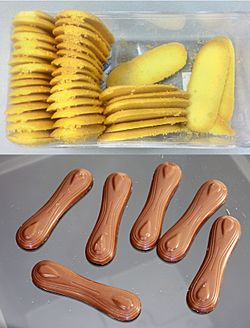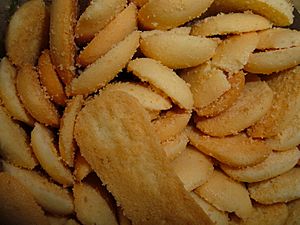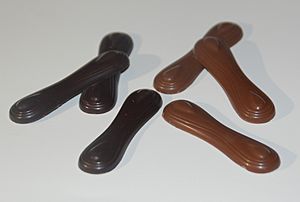Cat tongue facts for kids

Cat tongues: biscuits (top), milk chocolate bars (bottom).
|
|
| Alternative names | Ladyfinger |
|---|---|
| Type | Biscuit or chocolate bar |
| Course | Dessert |
| Place of origin | France (biscuits), Austria (chocolate bars) |
A cat tongue is a special kind of small biscuit (which is like a cookie) or a chocolate bar. They are popular in many countries around the world, especially in Europe, Asia, and South America.
These treats get their name because they are shaped a bit like a cat's tongue: long and flat. People in different countries have their own names for them, like "langue de chat" in French, "Katzenzungen" in German, or "língua de gato" in Portuguese.
Contents
Cat Tongue Biscuits
Cat tongue biscuits are sweet and have a nice crunch. They are thought to have first appeared in France in the 1600s.
How Are They Made?
These biscuits are usually made from simple ingredients. These include egg whites, wheat flour, sugar, and sometimes butter and vanilla. They are baked in an oven until they are perfectly cooked. Sometimes, other flavors like chocolate, citrus, or different spices are added.
How Are They Eaten?
In Europe, cat tongue biscuits are often served in fun ways. They might be filled with a creamy ganache, a sweet cream, or fruit jam. Sometimes, two biscuits are put together like a sandwich. They can also be dipped in chocolate to make them extra special. In France, people often eat them with cold treats like sorbet or ice cream. In the Canary Islands, they are served with a dessert called bienmesabe.
Special Baking Pans
To get their unique shape, bakers sometimes use a special pan called a "cat's tongue mold pan". The cookie dough is placed in this pan before baking. This type of pan is also used to make other pastries like ladyfingers and éclairs.
Cat Tongues in Japan
In Japan, a "langue de chat" is a bit different. It's a square sandwich cookie with a layer of white chocolate in the middle. One very famous brand that makes these is Shiroi Koibito. You can find these tasty cookies all over Japan.
Cat Tongue Chocolate Bars
Besides biscuits, cat tongues also come as chocolate bars! These are made from different kinds of chocolate, including milk chocolate, dark chocolate, and white chocolate.
Chocolate cat tongues have been around for a long time. An Austrian company called Küfferle started making them way back in 1892. Other companies in Europe, like Sarotti and Hachez, also make them. In Brazil, you can find them made by Zermatt and Kopenhagen. In Chile, they are called "Lengüitas de gato," meaning "little cat tongues." Many people in Hungary believe that a Swiss-born baker named Emil Gerbeaud invented these chocolate treats in the late 1880s.
 | Audre Lorde |
 | John Berry Meachum |
 | Ferdinand Lee Barnett |



